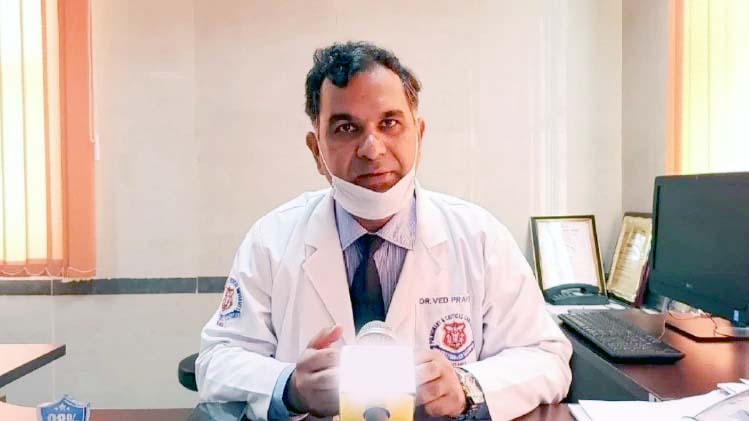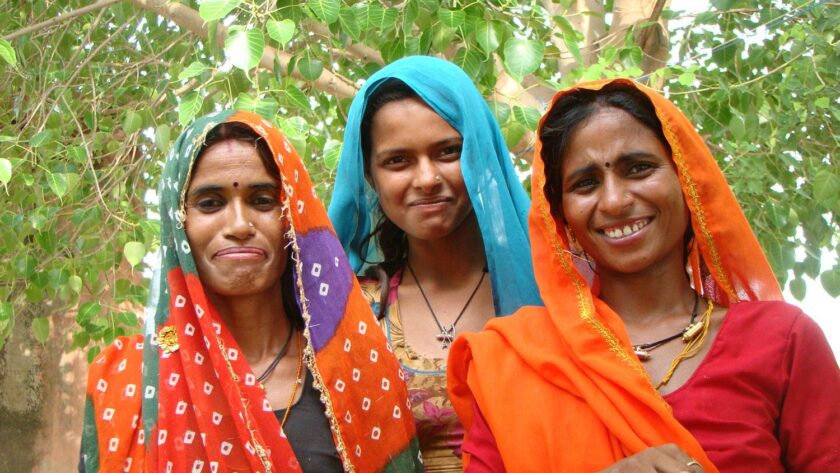“Our mission is to provide world-class pulmonary care at affordable costs, ensuring every patient has access to life-saving interventions.”
“With advanced interventional procedures, we are transforming the management of complex lung and airway diseases across the region.”
“Our department is committed to setting new benchmarks in pulmonary medicine, from critical care to minimally invasive interventions.”
Prof (Dr) Ved Prakash
Important Facts
1. Tracheal stenosis develops in 10–22% of patients requiring prolonged mechanical ventilation, with 1–2% progressing to severe disease requiring urgent intervention. Risk increases with duration—up to 12% if intubated >11 days.
2. Primary tracheal tumors are rare, with an incidence of 0.1 per 100,000 annually, but carry high morbidity and mortality if untreated.
3. Benign endobronchial growths occur in 0.025–0.32% of the general population, whereas metastatic endobronchial disease is seen in 2–50% of patients with extrapulmonary malignancies.
4. Airway narrowing after lung transplantation affects 2–32% of recipients, with bronchial stenosis being the most common complication (~8.3%).
5. Patients with central airway obstruction (CAO) experience significantly reduced survival: untreated malignant CAO carries a median survival of <3 months, while timely interventions can prolong survival beyond 1 year in many cases.
6. Endobronchial metastases are detected in up to 50% of patients with breast, colorectal, or renal cancers, often presenting with respiratory symptoms before the primary tumor recurs.
7. Tracheobronchomalacia (airway wall weakness) is seen in 4.5–13% of patients with COPD and in up to 23% of patients with chronic bronchitis, leading to recurrent infections and breathlessness.
8. Lung cryobiopsy, one of the advanced interventions now offered at KGMU, has a diagnostic yield of 74–85% in interstitial lung diseases, significantly higher than conventional forceps biopsy.
9. Airway stenting restores patency in 80–90% of patients with malignant central airway obstruction, with immediate improvement in dyspnea and quality of life.
10. Interventional pulmonary procedures reduce the need for surgical resections by nearly 40% in patients with benign airway conditions, thereby lowering both the cost and the risk of complications.
11. Airway complications (such as bronchial stenosis, dehiscence, or malacia) occur in 2–32% of lung transplant recipients, making interventional pulmonology crucial for graft survival.
Signs and Symptoms of Central Airway Disorders
• Progressive shortness of breath (dyspnea)
• Stridor
• Wheezing not responsive to asthma therapy Persistent or recurrent cough
• Voice changes or hoarseness
• Recurrent chest infections or pneumonia
• Unexplained fatigue and reduced exercise tolerance
• Choking spells or sensation of airway blockage
• Respiratory distress and acute airway emergency
Diagnostic modalities:
• CT scan with 3D reconstruction
• Bronchoscopy (flexible and rigid)
• Pulmonary function tests with flow-volume loops
• Virtual bronchoscopy and advanced imaging
Treatment Modalities for Central Airway Disorders
• Airway Balloon Dilatation
• Airway Stenting (silicone/metallic)
• Cryotherapy / Cryo-debulking
• Laser Therapy
• Electrocautery
• Argon Plasma Coagulation (APC)
• Endobronchial Tumor Debulking
• Tracheobronchoplasty
• Lung Cryobiopsy
• Tracheal Resection & Reconstruction
Success Stories at Pulmonary & Critical Care Medicine, KGMU
• Case 1: Tracheal Metastasis in a Cancer Survivor
An elderly woman with breast cancer that had metastasized to her trachea presented with severe breathlessness and stridor. The KGMU PCCM team performed an endoscopic rigid bronchoscopy with tumor debulking and airway stent placement, immediately restoring her breathing. She was discharged in stable condition and continues to live comfortably with regular follow-up.

• Case 2: Benign Endobronchial Lipoma
A middle-aged man suffered from chronic cough and recurrent chest infections. Bronchoscopy revealed a lipoma obstructing his left main bronchus. Using cryotherapy-assisted debulking, the lesion was removed safely, avoiding lung resection surgery. The patient’s lung function normalized, and he remains symptom-free.
• Case 3: Post-Lung Transplant Airway Stenosis
A 32-year-old man who had undergone a bilateral lung transplant for end-stage interstitial lung disease presented to the Department of Pulmonary, Critical Care & Sleep Medicine at KGMU with progressive shortness of breath, noisy breathing, and recurrent chest infections 1.5 year after his surgery. Despite being on optimal immunosuppressive therapy, his lung function was deteriorating.
A CT scan of the thorax with 3D reconstruction revealed severe narrowing of the right bronchus intermedius, a known complication following lung transplantation. Flexible bronchoscopy confirmed a circumferential narrowing at the anastomotic site.
The interventional pulmonology team at KGMU planned a stepwise airway intervention. An initial airway balloon dilatation was performed to expand the narrowed bronchus, immediately improving airflow. The procedure was completed successfully, with excellent restoration of bronchial lumen patency.
Following the intervention, the patient’s oxygen levels improved dramatically. He was discharged and continues to be under regular follow-up. The intervention not only prevented graft dysfunction and potential graft loss but also significantly improved his quality of life, allowing him to resume normal daily activities.
This case highlights KGMU’s expertise in managing complex post-transplant airway complications—a highly specialized area that requires advanced skills, technology, and multidisciplinary care. Such successful outcomes demonstrate the department’s capacity to provide world-class interventional pulmonology at an affordable cost, making it one of the few public sector institutions in India capable of delivering such advanced therapies.
Departmental Progress and World-Class Facilities
Since its establishment in 2016, the Department of Pulmonary, Critical Care & Sleep Medicine at KGMU has grown into one of India’s leading centres for advanced respiratory care. What began as a modest setup has evolved into a hub of cutting-edge clinical services, research, and training, catering to patients across Uttar Pradesh and neighbouring states.
Over the years, the department has built the largest dedicated Respiratory Intensive Care Unit (RICU) in India with 30 beds, consistently maintaining cure rates close to 85% and a ventilator-associated pneumonia (VAP) rate of less than 10%, standards that rival the best international ICUs.
Recognizing the need for precision in diagnosis, an Advanced Pulmonary Function Testing (PFT) Laboratory was established, equipped with spirometry, diffusion studies, impulse oscillometry, and body plethysmography, enabling comprehensive evaluation of complex lung diseases.
Parallelly, the department pioneered an Interventional Pulmonology Suite, where a full spectrum of advanced procedures is now routinely performed—including EBUS (endobronchial ultrasound), rigid bronchoscopy, airway stenting, cryobiopsy, and tumor debulking—making such interventions accessible and affordable in the public sector.
In keeping with the holistic care approach, Pulmonary Rehabilitation facilities were introduced, offering structured exercise training, education, and support for patients with COPD, interstitial lung disease, post-COVID fibrosis, and other chronic respiratory disorders, significantly improving quality of life.
The journey of expansion also included the establishment of a Level-1 Polysomnography Sleep Lab, which has positioned the department at the forefront of diagnosis and management of sleep-disordered breathing, including obstructive sleep apnea.
From 2016 to today, the department’s trajectory has been one of relentless growth, innovation, and patient-centred care, standing as a testimony to KGMU’s mission of delivering world-class respiratory medicine at affordable costs.
Commitment to Equitable Care
At KGMU, advanced interventional pulmonary procedures—such as rigid bronchoscopy, EBUS-guided biopsies, and sleep apnea interventions—are offered at a fraction of the cost charged by private hospitals. For example, procedures that may cost ₹10 lakh in private centres are available at KGMU for ₹20,000–30,000, making cutting-edge care accessible to patients from all socio-economic backgrounds. By optimally utilizing public healthcare infrastructure while maintaining uncompromising standards of quality, the department continues its mission of delivering world-class pulmonary care at truly affordable costs.
Future Vision: Pioneering Advanced Pulmonary Care
The Department of Pulmonary, Critical Care & Sleep Medicine at KGMU envisions itself as a global leader in advanced respiratory care, combining cutting-edge technology with equitable patient access. Building on its current strengths in interventional pulmonology, critical care, and sleep medicine, the department is set to establish a state-of-the-art Lung Transplant Centre, aimed at addressing the growing burden of end-stage lung diseases in India and the region.
The Lung Transplant Centre will offer a comprehensive spectrum of services, from pre-transplant evaluation and donor selection to post-transplant care and rehabilitation. This initiative will position KGMU as one of the few public centres in India providing affordable, world-class lung transplantation, reducing the need for patients to seek costly treatment abroad. Beyond transplantation, the department’s vision includes expansion of advanced pulmonary failure management, development of innovative research programs in chronic lung diseases, and training the next generation of pulmonologists and critical care specialists. By integrating patient-centric care with pioneering clinical research and education, the department aims to redefine standards of excellence in pulmonary medicine while remaining committed to accessibility and affordability for all patients.”Professor Ved Prakash, Head of the Department of Pulmonary and Critical Care Medicine, Dr. Sachin Kumar, Dr. Mohammad Arif, Dr. Anurag, Dr. Deepak, Dr. Subhra, Dr. Sandeep, Dr. Aparna, Dr. Harshita, Dr. Deepak, and other doctors from the department were present at this press conference.










